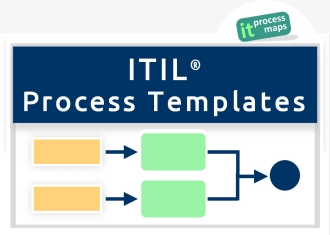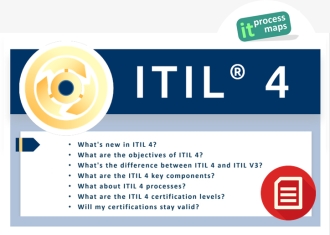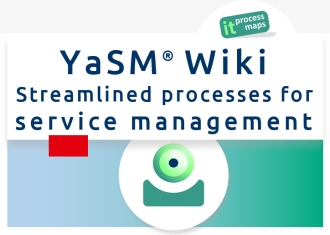Service Delivery: Difference between revisions
No edit summary |
mNo edit summary |
||
| Line 1: | Line 1: | ||
<seo metakeywords="service support, itil service support, itil service support processes" metadescription="Process Objective: Service Delivery ensures that binding rules for the operative Processes are in existence. It regulates the planning, contractual ..." /> | |||
<imagemap> | |||
Image:ITIL-Wiki-deutsch.jpg|right|ITIL Service Delivery | |||
default [https://wiki.de.it-processmaps.com/index.php/Service_Delivery diese Seite auf Deutsch] | |||
desc none | |||
</imagemap> | |||
<br style="clear:both;"/> | |||
'''ITIL Version''': ITIL | '''ITIL Version''': ITIL V2 '''→''' see also ''[[ITIL Processes#ITIL V3 Processes|ITIL V3 Processes]]'' | ||
'''Process Objective''': '''Service Delivery''' ensures that binding rules for the operative Processes are in existence. It regulates the planning, contractual and financial topics. | '''Process Objective''': '''Service Delivery''' ensures that binding rules for the operative Processes are in existence. It regulates the planning, contractual and financial topics. | ||
| Line 13: | Line 16: | ||
==Sub-Processes of Service Delivery== | ==Sub-Processes of Service Delivery== | ||
<imagemap> | |||
Image:overview_service_delivery_itilv2_thumb.jpg|left|Overview of Service Delivery, ITIL V2|350px|thumb | |||
default [https://wiki.en.it-processmaps.com/images/pdf/process_overview_service_delivery_itilv2.pdf Overview of ITIL Service Delivery, ITIL V2 (.pdf)] | |||
desc bottom-left | |||
</imagemap> | |||
;[[Service Level Management - ITIL V2|Service Level Management]] | ;[[Service Level Management - ITIL V2|Service Level Management]] | ||
:Process Objective: Service Level Management has the tasks of maintaining the IT | :Process Objective: Service Level Management has the tasks of maintaining the IT Organization's Service Catalogue and reaching binding agreements for internal and external Service Performances. At the interface with the client, Service Level Agreements are agreed. The Service Level Manager is responsible for the monitoring of the agreed quality parameters and where necessary resorts to counter-measures. The adequate provision of internal IT Services is secured via Operational Level Agreements and Underpinning Contracts (OLAs/ UCs). | ||
;[[Availability Management - ITIL V2|Availability Management]] | ;[[Availability Management - ITIL V2|Availability Management]] | ||
:Process Objective: Availability Management allows IT | :Process Objective: Availability Management allows IT Organizations to sustain the availability of the IT infrastructure in order to meet the agreed Service Levels defined in SLAs. It constantly monitors the achieved availability levels and where necessary, undertakes corrective measures. | ||
;[[Capacity Management - ITIL V2|Capacity Management]] | ;[[Capacity Management - ITIL V2|Capacity Management]] | ||
:Process Objective: Capacity Management supports the optimum and cost effective provision of IT Services by helping IT | :Process Objective: Capacity Management supports the optimum and cost effective provision of IT Services by helping IT Organizations match their IT Resources (Software, Hardware, Human Resources) to the business needs. The process involves estimations of future demand, which are the basis for planning future capacity needs, resulting in the Capacity Plan. | ||
;[[IT Service Continuity Management - ITIL V2|IT Service Continuity Management]] | ;[[IT Service Continuity Management - ITIL V2|IT Service Continuity Management]] | ||
| Line 29: | Line 36: | ||
;[[Financial Management for IT Services]] | ;[[Financial Management for IT Services]] | ||
:Process Objective: Financial Management for IT Services ensures the most economical usage of IT Financial resources and charges clients for the provision of IT Services. During this, a balanced relationship between quality and costs must be achieved whilst taking into account the client's requirements. The carrying out of the regular budget planning and the clearance of approved financial means is also one of Financial Management's tasks. | :Process Objective: Financial Management for IT Services ensures the most economical usage of IT Financial resources and charges clients for the provision of IT Services. During this, a balanced relationship between quality and costs must be achieved whilst taking into account the client's requirements. The carrying out of the regular budget planning and the clearance of approved financial means is also one of Financial Management's tasks. | ||
<!-- This page is assigned to the following categories: --> | |||
[[Category:ITIL V2|!]][[Category:ITIL discipline]][[Category:ITIL process]][[Category:Service Delivery|!]] | |||
<!-- --- --> | |||
Revision as of 09:02, 27 July 2011
<seo metakeywords="service support, itil service support, itil service support processes" metadescription="Process Objective: Service Delivery ensures that binding rules for the operative Processes are in existence. It regulates the planning, contractual ..." />

ITIL Version: ITIL V2 → see also ITIL V3 Processes
Process Objective: Service Delivery ensures that binding rules for the operative Processes are in existence. It regulates the planning, contractual and financial topics.
Part of: IT Service Management
Sub-Processes of Service Delivery

- Service Level Management
- Process Objective: Service Level Management has the tasks of maintaining the IT Organization's Service Catalogue and reaching binding agreements for internal and external Service Performances. At the interface with the client, Service Level Agreements are agreed. The Service Level Manager is responsible for the monitoring of the agreed quality parameters and where necessary resorts to counter-measures. The adequate provision of internal IT Services is secured via Operational Level Agreements and Underpinning Contracts (OLAs/ UCs).
- Availability Management
- Process Objective: Availability Management allows IT Organizations to sustain the availability of the IT infrastructure in order to meet the agreed Service Levels defined in SLAs. It constantly monitors the achieved availability levels and where necessary, undertakes corrective measures.
- Capacity Management
- Process Objective: Capacity Management supports the optimum and cost effective provision of IT Services by helping IT Organizations match their IT Resources (Software, Hardware, Human Resources) to the business needs. The process involves estimations of future demand, which are the basis for planning future capacity needs, resulting in the Capacity Plan.
- IT Service Continuity Management
- Process Objective: IT Service Continuity Management defines and plans all measures and processes for unpredicted events of disaster. The regular analysis of vulnerabilities, threats and risks represents a basis for suitable precautions.
- Financial Management for IT Services
- Process Objective: Financial Management for IT Services ensures the most economical usage of IT Financial resources and charges clients for the provision of IT Services. During this, a balanced relationship between quality and costs must be achieved whilst taking into account the client's requirements. The carrying out of the regular budget planning and the clearance of approved financial means is also one of Financial Management's tasks.






